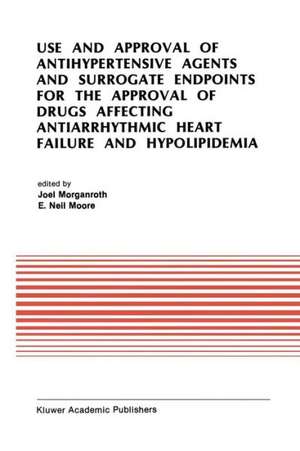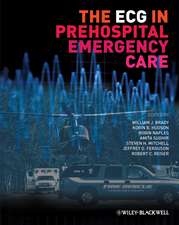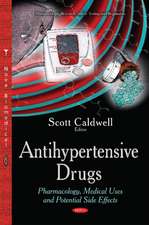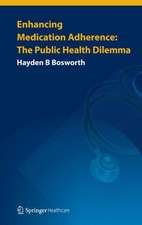Use and Approval of Antihypertensive Agents and Surrogate Endpoints for the Approval of Drugs Affecting Antiarrhythmic Heart Failure and Hypolipidemia: Proceedings of the Tenth Annual Symposium on New Drugs & Devices, October 31 – November 1, 1989: Developments in Cardiovascular Medicine, cartea 112
Editat de J. Morganroth, E. Neil Mooreen Limba Engleză Paperback – 5 oct 2011
| Toate formatele și edițiile | Preț | Express |
|---|---|---|
| Paperback (1) | 1091.35 lei 6-8 săpt. | |
| Springer Us – 5 oct 2011 | 1091.35 lei 6-8 săpt. | |
| Hardback (1) | 1098.27 lei 6-8 săpt. | |
| Springer Us – 31 mai 1990 | 1098.27 lei 6-8 săpt. |
Din seria Developments in Cardiovascular Medicine
- 5%
 Preț: 1484.50 lei
Preț: 1484.50 lei - 5%
 Preț: 375.17 lei
Preț: 375.17 lei - 5%
 Preț: 354.10 lei
Preț: 354.10 lei - 5%
 Preț: 1419.03 lei
Preț: 1419.03 lei - 5%
 Preț: 376.43 lei
Preț: 376.43 lei - 5%
 Preț: 1098.27 lei
Preț: 1098.27 lei - 5%
 Preț: 1438.38 lei
Preț: 1438.38 lei - 5%
 Preț: 376.78 lei
Preț: 376.78 lei - 5%
 Preț: 368.37 lei
Preț: 368.37 lei - 5%
 Preț: 380.25 lei
Preț: 380.25 lei - 5%
 Preț: 2117.58 lei
Preț: 2117.58 lei - 5%
 Preț: 367.28 lei
Preț: 367.28 lei - 5%
 Preț: 366.56 lei
Preț: 366.56 lei - 5%
 Preț: 371.10 lei
Preț: 371.10 lei - 5%
 Preț: 370.94 lei
Preț: 370.94 lei - 5%
 Preț: 783.18 lei
Preț: 783.18 lei - 5%
 Preț: 713.18 lei
Preț: 713.18 lei - 5%
 Preț: 1098.27 lei
Preț: 1098.27 lei - 5%
 Preț: 375.49 lei
Preț: 375.49 lei - 5%
 Preț: 373.47 lei
Preț: 373.47 lei - 5%
 Preț: 723.93 lei
Preț: 723.93 lei - 5%
 Preț: 1104.13 lei
Preț: 1104.13 lei - 5%
 Preț: 2117.20 lei
Preț: 2117.20 lei - 5%
 Preț: 716.09 lei
Preț: 716.09 lei - 5%
 Preț: 372.03 lei
Preț: 372.03 lei - 5%
 Preț: 722.33 lei
Preț: 722.33 lei - 5%
 Preț: 660.07 lei
Preț: 660.07 lei - 5%
 Preț: 375.34 lei
Preț: 375.34 lei - 5%
 Preț: 1423.22 lei
Preț: 1423.22 lei - 5%
 Preț: 715.35 lei
Preț: 715.35 lei - 5%
 Preț: 790.69 lei
Preț: 790.69 lei - 5%
 Preț: 720.68 lei
Preț: 720.68 lei - 5%
 Preț: 3185.49 lei
Preț: 3185.49 lei - 5%
 Preț: 1418.27 lei
Preț: 1418.27 lei - 5%
 Preț: 784.64 lei
Preț: 784.64 lei - 5%
 Preț: 714.63 lei
Preț: 714.63 lei - 5%
 Preț: 370.74 lei
Preț: 370.74 lei - 5%
 Preț: 376.22 lei
Preț: 376.22 lei - 5%
 Preț: 660.85 lei
Preț: 660.85 lei - 5%
 Preț: 368.37 lei
Preț: 368.37 lei
Preț: 1091.35 lei
Preț vechi: 1148.78 lei
-5% Nou
Puncte Express: 1637
Preț estimativ în valută:
208.86€ • 216.39$ • 174.31£
208.86€ • 216.39$ • 174.31£
Carte tipărită la comandă
Livrare economică 21 martie-04 aprilie
Preluare comenzi: 021 569.72.76
Specificații
ISBN-13: 9781461288091
ISBN-10: 1461288096
Pagini: 244
Ilustrații: X, 230 p.
Dimensiuni: 155 x 235 x 13 mm
Greutate: 0.35 kg
Ediția:Softcover reprint of the original 1st ed. 1990
Editura: Springer Us
Colecția Springer
Seria Developments in Cardiovascular Medicine
Locul publicării:New York, NY, United States
ISBN-10: 1461288096
Pagini: 244
Ilustrații: X, 230 p.
Dimensiuni: 155 x 235 x 13 mm
Greutate: 0.35 kg
Ediția:Softcover reprint of the original 1st ed. 1990
Editura: Springer Us
Colecția Springer
Seria Developments in Cardiovascular Medicine
Locul publicării:New York, NY, United States
Public țintă
ResearchCuprins
I. Approaches and Methods to Studying Antihypertensive Drugs.- 1. New concepts in antihypertensive drug therapy.- 2. Is ambulatory blood pressure monitoring required to define the hypertensive patient and to detect efficacy?.- 3. What vascular effects should be measured in antihypertensive drug research?.- 4. Is it necessary to demonstrate changes in left ventricular hypertrophy in the evaluation of antihypertensive drugs?.- 5. Clinical trials of antihypertensive agents.- 6. How does one define dose-duration of an antihypertensive drug? What is the role of non-Mem and the Peak/Through measurement.- II. What Should be Required for FDA Approvability of a New Antihypertensive Drug?.- 7. What have we learned from prior clinical trials of antihypertensive drug therapy?.- 8. Are specific studies in elderly patients required for FDA approvability of a new antihypertensive drug?.- 9. Do we need any more antihypertensive drugs: The validity of a change in blood pressure as the only endpoint for approvability?.- 10. The cost and time to develop a new antihypertensive drug depending upon the endpoint.- III. Surrogate Endpoints to Define Risk VS. Benefits.- 11. What should be required for FDA approvability of a new antihypertensive drug? What is the FDA’s viewpoint?.- 12. Are there valid surrogate endpoints for mortality that can be used to evaluate the effects of antiarrhythmic drug therapy?.- 13. How to demonstrate the efficacy of a new drug for the treatment of chronic heart failure.- 14. Testing the relationship between cholesterol lowering and cardiovascular disease — past, present, and prospects.- Participant List.















